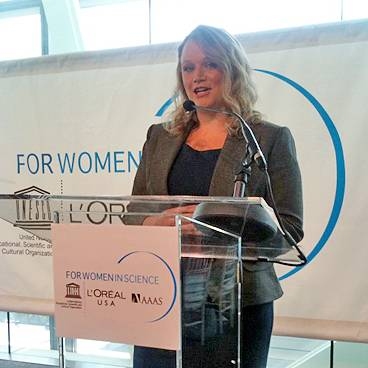Lindley Winslow, a postdoc in the MIT Department of Physics, was recently awarded a $60,000 research grant by L'Oreal USA as part of a fellowship program that aims to recognize and reward the most promising postdoctoral female scientists in the United States.
Winslow is a particle physicist who focuses on answering the question of why there is more matter than anti-matter in the universe. Her main project is the Double Chooz experiment, a European-American-Japanese collaboration that measures the flux of anti-neutrinos — particles generated whenever protons change into neutrons — made by a nuclear reactor. The experiment's findings are particularly relevant as the ability to track nuclear fuel has become more important for countries considering nuclear power as a sustainable energy source.
Winslow is among five postdocs selected this year for The L'Oreal USA Fellowship For Women in Science; she will use her grant to design and build a novel particle detector based on quantum dots, which could lead to a new method of monitoring the operation of nuclear reactors and tracking nuclear fuel.
“I’m delighted to be a recipient of the L’Oréal For Women in Science Fellowship,” said Winslow, a member of the Neutrino and Dark Matter Group at MIT with Professor Janet Conrad. “It’s exciting to have a project that I can own and control from beginning to end. This grant will give me the opportunity to prove myself at a point that’s pivotal in my career.”
Winslow’s parents, both in the medical field, encouraged her to pursue the sciences when she was young. Although she didn’t have a strong inclination towards a career in this area, in high school she took a physics class and realized that she excelled at it. Her curiosity soon blossomed and led her to an educational path in nuclear particle astrophysics, which examines ties between the smallest particles in the universe and cosmology.
When not busy in the lab and field, Winslow is an active mentor to approximately 15 students, including five women within her research group. Mentoring is not new to Winslow, who coordinated the Society of Women in the Physical Sciences at the University of California, Berkeley, for four years. She credits the program with introducing her to other women in physics and helping sustain her interest in the field. She also acted as a teaching assistant for the Physics Scholar Program for minorities and women in physics and engineering. Winslow enjoys mentorship and helping to perpetuate a chain of female scientists in a typically male-dominated field.
Winslow received her BA in physics and astrophysics from the University of California, Berkeley, in 2001. She continued there, receiving her master’s and her PhD in physics.
Winslow is a particle physicist who focuses on answering the question of why there is more matter than anti-matter in the universe. Her main project is the Double Chooz experiment, a European-American-Japanese collaboration that measures the flux of anti-neutrinos — particles generated whenever protons change into neutrons — made by a nuclear reactor. The experiment's findings are particularly relevant as the ability to track nuclear fuel has become more important for countries considering nuclear power as a sustainable energy source.
Winslow is among five postdocs selected this year for The L'Oreal USA Fellowship For Women in Science; she will use her grant to design and build a novel particle detector based on quantum dots, which could lead to a new method of monitoring the operation of nuclear reactors and tracking nuclear fuel.
“I’m delighted to be a recipient of the L’Oréal For Women in Science Fellowship,” said Winslow, a member of the Neutrino and Dark Matter Group at MIT with Professor Janet Conrad. “It’s exciting to have a project that I can own and control from beginning to end. This grant will give me the opportunity to prove myself at a point that’s pivotal in my career.”
Winslow’s parents, both in the medical field, encouraged her to pursue the sciences when she was young. Although she didn’t have a strong inclination towards a career in this area, in high school she took a physics class and realized that she excelled at it. Her curiosity soon blossomed and led her to an educational path in nuclear particle astrophysics, which examines ties between the smallest particles in the universe and cosmology.
When not busy in the lab and field, Winslow is an active mentor to approximately 15 students, including five women within her research group. Mentoring is not new to Winslow, who coordinated the Society of Women in the Physical Sciences at the University of California, Berkeley, for four years. She credits the program with introducing her to other women in physics and helping sustain her interest in the field. She also acted as a teaching assistant for the Physics Scholar Program for minorities and women in physics and engineering. Winslow enjoys mentorship and helping to perpetuate a chain of female scientists in a typically male-dominated field.
Winslow received her BA in physics and astrophysics from the University of California, Berkeley, in 2001. She continued there, receiving her master’s and her PhD in physics.






